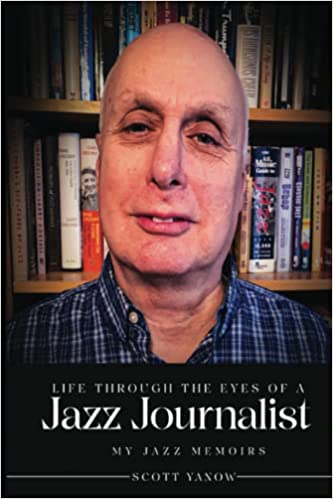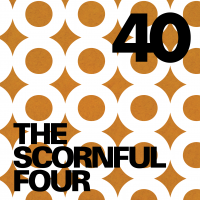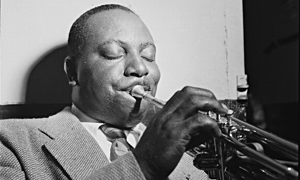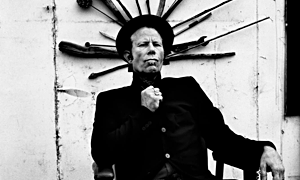Home » Jazz Articles » Book Review » Life Through The Eyes Of A Jazz Journalist
Life Through The Eyes Of A Jazz Journalist
This memoir is fun and informative for anyone reading it, but the aspiring music critic would do well to study the last part of the book.
 Life Through The Eyes Of A Jazz Journalist
Life Through The Eyes Of A Jazz Journalist Scott Yanow
291 Pages
ISBN-13: # 978-1958324028
Amazon Pro Hub
2022
Meet the Sisyphus who rolled the rock all the way up the hill. His name is Scott Yanow.
Yanow's is a name that should be known, if not well known, to the readers of this review. This raises the question, "Who is the audience for a book entitled, Life Through The Eyes Of A Jazz Journalist?" The majority of reviews of this book address Yanow's interviews, famous shows he has attended and seminal jazz musicians he has known. All of that exists in the first four-fifths of this book. That is fine. But it is in the final 20 percent of the memoir where Scott Yanow describes his chosen craft.
In the chapter entitled, "Thoughts on Jazz Criticism," the author lays out his personal theory and logistics of jazz criticism. Simply saying that statement is funny, sad and triumphant all at once. As a musical genre, jazz exists somewhere between nothing and zero with regard to the market share it commands in the 21st-century music industry. It is a fussy and difficult category that requires the listener to take more than a passive role in listening to it. It is a wholly American product, like baseball and the Constitution. As a gift to the world, jazz has been that unique vessel, assimilating each culture it touches. It is of such extreme cultural importance that it should be no surprise so many wish to write about it.
But for all but a select few, writing about a genre that has such little significance to a modern population is more a hobby and labor of love than a means to make money and support a family. Yanow is one of the precious few who has been able to make a living writing about jazz and his imprint on jazz journalism cannot be minimized. Yanow comments that his audience is, ..."not primarily musicians, and certainly not other critics, but jazz fans both veteran collectors and those who are new to the music." What he means is this is the audience to whom his writing is directed. Because it is guaranteed that musicians and critics alike read Yanow and I suspect that they are the main audience of this book.
Yanow reveals that as a music journalist, he is completely self-taught. He became interested in jazz exclusively and went on the read and listen to everything he could. Reaching a threshold of both knowledge and confidence, he began to write. In the process, he developed a narrative direction.
My goal in writing reviews is to give readers enough clues so they will know whether they will like a particular recording or not. My opinion, although freely given, is secondary to providing others with the information that will lead them in the right direction. In a review, when in doubt, describe the music without getting too technical, and be sure to tell the readers what they would be getting for their money if they acquire a release.
Yanow favors an educational approach, concentrating less on subjective terms like "good" and 'bad" and more on what a given recording is similar to. If a listener likes Miles Davis, Yanow would ostensibly guide listeners to Davis' contemporaries, like Dizzy Gillespie, Howard McGhee, Freddie Hubbard, Woody Shaw, Roy Eldridge and Chet Baker.
Another timely suggestion from Yanow:
One should not write about a style of jazz unless they can tell the difference between good and great (my emphasis); good and bad is much easier. For example, if a writer does not like electric instruments, then their opinion about a synthesizer player is not worth much because, no matter what is being played, they will not care for it. If another writer cannot appreciate early jazz because of the recording quality, or if they think jass was too primitive before the rise of John Coltrane, they should stick to the eras that they understand and appreciate.
These suggestions reflect the qualities of Yanow and his writing: studied, urbane, informative, and humble. This memoir is fun and informative for anyone reading it, but the aspiring music critic would do well to study the last part of the book. It is there where Scott Yanow reveals who he is and where his love of this particular music shines most brightly.
Tags
PREVIOUS / NEXT
Support All About Jazz
 All About Jazz has been a pillar of jazz since 1995, championing it as an art form and, more importantly, supporting the musicians who make it. Our enduring commitment has made "AAJ" one of the most culturally important websites of its kind, read by hundreds of thousands of fans, musicians and industry figures every month.
All About Jazz has been a pillar of jazz since 1995, championing it as an art form and, more importantly, supporting the musicians who make it. Our enduring commitment has made "AAJ" one of the most culturally important websites of its kind, read by hundreds of thousands of fans, musicians and industry figures every month.


























